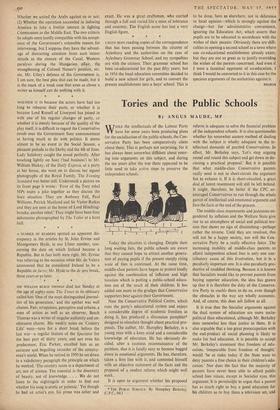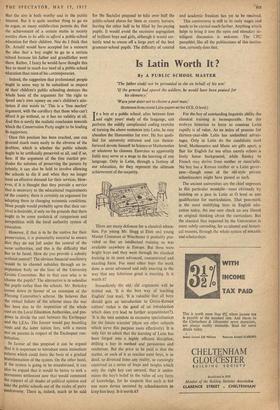Tories and the Public Schools
By ANGUS MAUDE, MP WH1LE the intellectuals of the Labour Party have for some years been producing plans for the socialisation of the public schools, the Con- servative Party has. been comparatively silent about them. This is perhaps not surprising, for it has always been somewhat diffident about enter- ing into arguments on this subject, and during the ten years after the war there appeared to be little need to take active steps to preserve the independent schools.
Today the situation is changing. Despite their long waiting lists, the public schools are aware that they cannot hope to attract another genera- tion of paying pupils if the present steeply rising scale of fees is continued. At the same time, middle-class parents have begun to protest loudly against the combination of 'inflation and high taxation which is putting a public-school educa- tion out of the reach of their children. It has added one more to the grudges that Conservative supporters bear against their Government.
Now the Conservative Political Centre, which runs the party's educational system and enjoys a considerable degree of academic freedom in doing it, has produced a discussion pamphlet* designed to stimulate thought about practical pro- posals. The author, Mr. Humphry Berkeley, is a young man with a keen mind and a considerable knowledge a education. He has obviously de- cided, after a cautious reconnaissance of the problem, that it is fatally easy to become bogged down in emotional arguments. He has, therefore, taken a firm line with it, and contented himself with an objective statement of the facts and the proposal of a modest reform which might well work.
It is open to argument whether his proposed * THE PUBLIC SCHOOLS. By Humphry Berkeley. (C.P.C., 9d.) reform is adequate to solve the financial problem of the independent schools. It is also questionable whether his somewhat austere method of dealing with the subject is wholly adequate to the in- tellectual demands of puzzled Conservatives. In effect, Mr. Berkeley says, 'Let's stop arguing round and round this subject and get down to dis- cussing a practical proposal.' But it is possible that what middle-class Conservative parents really need is not to short-circuit the argument but to exhaust it. If it is short-circuited, a great deal of latent resentment will still be left behind. It might, therefore, be better if the CPC en- couraged Conservatives to run through the whole gamut of intellectual and emotional argument and face the facts at the end of the process.
The middle-class resentments and jealousies en- gendered by inflation and the Welfare State give rise to an atmosphere of social and political ten- sion that shows no sign of diminishing—perhaps rather the reverse. Until they are resolved, this will not be a happy society, nor will the Con- servative Party be a really effective force. The increasing inability of middle-class parents to afford independent school fees is only one con- tributory cause of this frustration, but it is a peculiarly important one. It is also peculiarly pro- ductive of muddled thinking. Because it is known that Socialists would like to prevent parents from buying superior education, the idea has grown up that it is therefore the duty of the Conserva- tive Party to enable them to do so, even though the obstacles in the way are wholly economic. And, of course, this does not follow at all.
It is true that the Socialist arguments against the dual system of education are more socio- political than educational, although Mr. Berkeley does somewhat less than justice to them. It is also arguable that a too great preoccupation with the end-product of social planning is likely to make for bad education. It is possible to accept Mr. Berkeley's statement that freedom of edu- cation, 'inseparable from freedom of thought,' would 'be at stake today if the State were to deny parents a free choice in their children's edu- cation.' Nor does the fact that the majority of parents have never been able to afford public school fees vitiate, except in Socialist eyes, this argument. It is permissible to argue that a parent has as much right to buy a good education for his children as to buy them a television set, and that the aim is both worthy and in the public Interest. But it is quite another thing to go on to argue, as many middle-class parents do, that the achievement of a certain status in society entitles them to be able to afford a public-school education for their children. Nor do I think that Dr. Arnold would have accepted for a moment the idea that a boy ought to go to a certain 'school because his father and grandfather went there. Rather, I fancy he would have thought this boy to stand in much less need of a public-school education than most of his contemporaries.
Indeed, the suggestion that professional people • ought in some way to be subsidised in respect of their children's public schooling destroys the Whole basis of the argument for 'the right to spend one's own money on one's children's edu- cation if one wants to.' This is a 'free market' argument, with the corollary that those who can't afford it go without, or it has no validity at all. And this is surely the realistic conclusion towards Which the Conservative Party ought to be leading its supporters.
Once this position has been reached, one can Proceed much more easily to the obverse of the problem, which is whether the public schools ought to be artificially preserved at all, and if so, how. If the argument of the free market pre- cludes the solution of preserving the parents by subsidy, it can also be held to involve allowing the schools to die if and when they no longer meet an effective demand for their services. How- ever, if it is thought that they provide a service that is necessary to the educational requirements of the country, there is certainly an argument for adapting them to changing economic conditions. Most people would probably agree that their sur- vival is desirable, if only on the grounds that there ought to be some yardstick of comparison and competition with the local authority system of education.
However, if that is to be the motive for their preservation, it is presumably essential to ensure that they do not fall under the control of the same authorities, and this is the difficulty that has to be faced. How do you provide a subsidy Without control? The obvious financial machinery Would be to channel subsidies through an in- dependent body on the lines of the University Grants Committee. But in that case who is to choose the pupils? The alternative is to subsidise the pupils rather than the schools. Mr. Berkeley comes down in favour of an extension of the Fleming Committee's scheme. He believes that the virtual failure of the scheme since the war has been due to the imposition of the whole cost on the Local Education Authorities, and pro- poses to divide the cost between the Exchequer and the LEAs. The former would pay boarding costs and the latter tuition fees, with a means test on parents in respect of the Exchequer con- tribution.
In favour of this proposal it can be argued that it is important to introduce some immediate reform which could form the basis of a gradual transformation of the system. On the other hand, If the system is going to be transformed, it can also be argued that it would be better to seek a Permanent settlement now that would command the support of all shades of political opinion and take the public schools out of the realm of party controversy. There is, indeed, much to be said for the Socialist proposal to take over half the public-school places for State or county bursars, leaving the other half to be filled by fee-paying pupils. It would avoid the excessive segregation of brilliant boys and girls, although it would cer- tainly tend to cream off a large part of the best grammar-school pupils. The difficulty of control and academic freedom has yet to be resolved.
This controversy is still in its early stages and needs to be carried much farther. Anything which helps to bring it into the open and stimulate in- telligent discussion is welcome. The CPC pamphlet, like all the publications of this institu- tion, certainly does that.



































 Previous page
Previous page